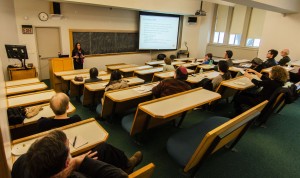By Silvia Foster-Frau
This semester, Grinnell welcomed Gina Cerasani, Ph.D. candidate at the School for Conflict Analysis (S-CAR) at George Mason University for four weeks to teach at Grinnell. Her work at Grinnell includes a Peace Studies short course entitled “Conflict Analysis” and an all-day simulation this past Saturday on March 2. The simulation centered on the controversial practice of mountaintop removal mining in Appalachia.
Cerasani’s arrival is the result of just one of the Peace Studies Program’s efforts to bring the vital study of conflict analysis and resolution to Grinnell College.

“I think that there’s a desire on the part of the Peace Studies Program to have a conflict analysis course taught more regularly, to have it more available to students, so part of [coming to Grinnell] was to see what the level of interest is from students, and what some of their reasons are for coming into a course like this,” Cerasani said. “So my objective, really, is to try to take a complex topic like conflict analysis and try to zero in on a few critical conflicts that could be taught in four weeks.”
Val Vetter, Coordinator of the Peace Studies Program, agrees on the goals of the program.
“We continually work to figure out how we might have a basic Intro to Peace Studies or to Conflict Analysis that students can use as they take other courses related to peace studies, but that maybe don’t have the strong conflict analysis component,” Vetter said. “[But] it’s not easy to add a faculty member to this campus and we don’t have anyone on campus who has that expertise.”
Grinnell has not offered a peace studies and conflict analysis anchor course since 2010, and although this concerns Vetter, it seems the program has found a solution with Cerasani.
Her strip-mining simulation on Saturday was a learning experience from both ends. The simulation contributed to the studies of Cerasani and her committee chair at George Mason, who is currently writing about how to effectively engage students in conflict analysis topics.
On the other end, students simulated a real-life conflict during the second portion of the workshop through a role-playing activity. Grinnell students, performing as members of a community affected by strip mining, will have a mock town meeting in order to discuss water contamination.
Peace and Conflict Studies is a growing field of academia not just in Grinnell, but around the world.
“The more students are studying this, the more they’re going on to get professional degrees in conflict analysis and conflict resolution,” Cerasani said. “To have people with that background and with that understanding of what conflicts are, I think that’s really valuable.”
Cerasani also values the interdisciplinarity of the field, because it tends to draw people from many different fields and then disperse these graduates back out into the world where they establish different careers. These diverse graduates, however, have one thing in common: the understanding of what conflicts really are and thus a process for bringing them toward transformation or resolution.
“Students come from many different fields and they go on into many different areas… but I think to be able to bring that deep understanding of conflict into all these different areas, I think that will be really helpful,” Cerasani said.
Although the deadline for participating in the Conflict Analysis simulation has passed, the Peace Studies Program is hosting several other upcoming events, including a lecture by David Cortright from the Kroc Institute for International Peace Studies and a short course on restorative justice.




























































